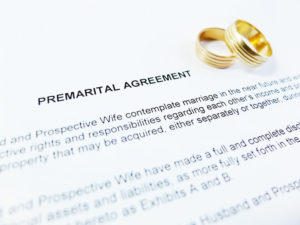 Misconceptions swirl around what premarital agreements, often referred to as “prenups,” are – and what they lead to. Partly, that is because they are often the subject of media stories about celebrities. (Justin Bieber is only the most recent – and that was because he was one of the few mega-celebrities not to have one.) It may also be partly because, if prenups do make media headlines, it is generally because a couple is getting divorced.
Misconceptions swirl around what premarital agreements, often referred to as “prenups,” are – and what they lead to. Partly, that is because they are often the subject of media stories about celebrities. (Justin Bieber is only the most recent – and that was because he was one of the few mega-celebrities not to have one.) It may also be partly because, if prenups do make media headlines, it is generally because a couple is getting divorced.
A Prudent Plan
But premarital agreements are in fact a prudent way to set forth what a couple has agreed upon regarding their assets. Marriage assets in today’s world are not the relatively simple affairs they were 50 years ago. Both partners may have worked and made considerable assets prior to the marriage, which didn’t use to be the case. Spouses may have children or other dependents from previous unions. Commingling of assets in a marriage can be complicated as a result of these contemporary trends.
While prenups can be used in the event of a divorce, they are used for other reasons as well. If one spouse dies unexpectedly, for example, and has children, a prenup can make clear that person’s plans for their descendants, their spouses, and any former partners vis-à-vis their assets. A prenup can be used as the foundation of an estate plan as well.
The bottom line is this: any lack of a plan for assets carries some risk, either that assets will not be disposed of as their owner would have wished or that there will be conflict involved. Conflict and ill feeling can carry over into other family members and last for generations if not handled properly. Developing a plan minimizes both risks.
Here are three facts to know about prenups.
1. They do not lead to divorce.
While prenups are often associated in media stories with divorce, the fact remains that the greater number are not used in divorces. More than 85% of mental health professionals believe they have no impact upon divorces. Prenups are more akin to wills – a plan setting forth the disposition and division of assets.
2. They need to be fair.
Most jurisdictions require both parties in a prenup to disclose their assets, so they need to be transparent and fair. Both partners generally bring their own attorneys to a prenup. In the event of a precipitating event, such as a divorce or death, a judge may invalid a premarital agreement that seems unfair.
3. They can include any type of asset.
People can include any type of asset in a prenup. Real estate, other property, and investments are standard, but a couple can also decide to include anything important to them, such as pets, or items that could have a financial impact, such as debt.
If You Need a Divorce Lawyer in New York or New Jersey
The Rockland County & Bergen County divorce lawyers at Kantrowitz, Goldhamer & Graifman have been assisting clients with solutions in New York and New Jersey for more than four decades.
If negotiation and settlement are not working, we will fight for your rights via litigation.
We are experts in division of marital assets, child custody, child support, visitation rights, alimony and spousal support, parental relocation, modification after divorce, and conservatorships.
Additional References:
- Fletcher, Christine. 10 Things You Need to Know About Prenups. Forbes. September 18, 2018. https://www.forbes.com/sites/christinefletcher/2018/09/18/10-things-you-need-to-know-about-prenups/#56b773f962ba.
- Solomon, Kristine. 8 myths about prenups you should stop believing. Business Insider. October 15, 2018. https://www.businessinsider.com/prenup-myths-you-should-stop-believing-2018-10.
